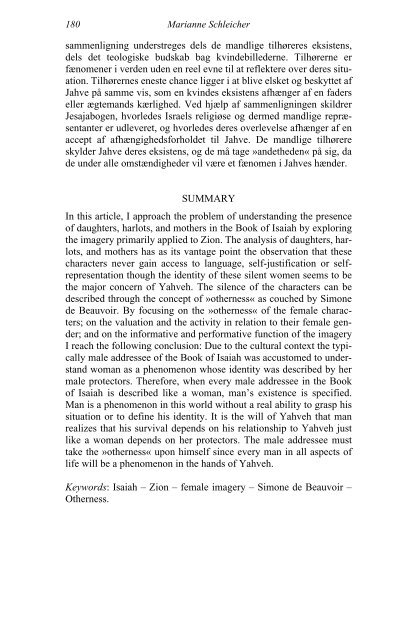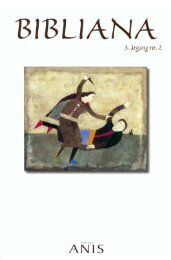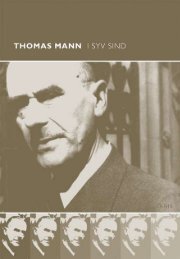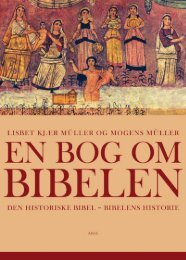DANSK TEOLOGISK TIDSSKRIFT 3/2000 - Anis
DANSK TEOLOGISK TIDSSKRIFT 3/2000 - Anis
DANSK TEOLOGISK TIDSSKRIFT 3/2000 - Anis
Create successful ePaper yourself
Turn your PDF publications into a flip-book with our unique Google optimized e-Paper software.
180 Marianne Schleicher<br />
sammenligning understreges dels de mandlige tilhøreres eksistens,<br />
dels det teologiske budskab bag kvindebillederne. Tilhørerne er<br />
fænomener i verden uden en reel evne til at reflektere over deres situation.<br />
Tilhørernes eneste chance ligger i at blive elsket og beskyttet af<br />
Jahve på samme vis, som en kvindes eksistens afhænger af en faders<br />
eller ægtemands kærlighed. Ved hjælp af sammenligningen skildrer<br />
Jesajabogen, hvorledes Israels religiøse og dermed mandlige repræsentanter<br />
er udleveret, og hvorledes deres overlevelse afhænger af en<br />
accept af afhængighedsforholdet til Jahve. De mandlige tilhørere<br />
skylder Jahve deres eksistens, og de må tage »andetheden« på sig, da<br />
de under alle omstændigheder vil være et fænomen i Jahves hænder.<br />
SUMMARY<br />
In this article, I approach the problem of understanding the presence<br />
of daughters, harlots, and mothers in the Book of Isaiah by exploring<br />
the imagery primarily applied to Zion. The analysis of daughters, harlots,<br />
and mothers has as its vantage point the observation that these<br />
characters never gain access to language, self-justification or selfrepresentation<br />
though the identity of these silent women seems to be<br />
the major concern of Yahveh. The silence of the characters can be<br />
described through the concept of »otherness« as couched by Simone<br />
de Beauvoir. By focusing on the »otherness« of the female characters;<br />
on the valuation and the activity in relation to their female gender;<br />
and on the informative and performative function of the imagery<br />
I reach the following conclusion: Due to the cultural context the typically<br />
male addressee of the Book of Isaiah was accustomed to understand<br />
woman as a phenomenon whose identity was described by her<br />
male protectors. Therefore, when every male addressee in the Book<br />
of Isaiah is described like a woman, man’s existence is specified.<br />
Man is a phenomenon in this world without a real ability to grasp his<br />
situation or to define his identity. It is the will of Yahveh that man<br />
realizes that his survival depends on his relationship to Yahveh just<br />
like a woman depends on her protectors. The male addressee must<br />
take the »otherness« upon himself since every man in all aspects of<br />
life will be a phenomenon in the hands of Yahveh.<br />
Keywords: Isaiah – Zion – female imagery – Simone de Beauvoir –<br />
Otherness.





